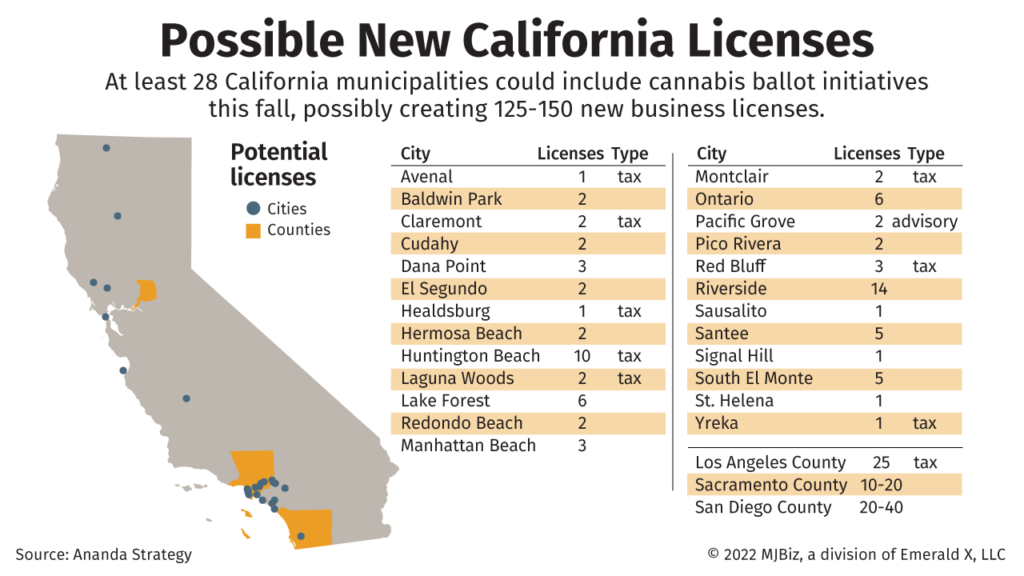This post was originally published on this site
Sponsored cannabis industry news from MJbizdaily.com

(This story and the graphic above have been updated to reflect that up to 150 retail licenses could be created through ballot measures in November.)
More than two dozen California cities and counties could establish new recreational marijuana markets through ballot measures in November, creating up to 150 retail licenses and countless other business opportunities for plant-touching and ancillary companies.
All in, at least 28 municipalities are in line to include some cannabis ballot initiatives this fall, the largest cohort since California started regulating adult use in 2018, according to MJBizDaily research.
“These upcoming ballot measures are encouraging,” said Dirk Voss, director of compliance and government for Zen Cannabis, which sells edibles and other THC- and CBD-infused products in California and other states.
“If passed, it will open up additional operational dispensaries throughout the state if those cities move forward and actually license dispensaries at the local level.”
The majority of referendums will ask voters to approve or prohibit marijuana businesses, particularly retail.
A handful of municipalities, including Huntington Beach in Orange County, Healdsburg in Sonoma County and Avenal in the Central Valley, will address local prohibition through marijuana business tax measures that would essentially pave the way for regulated markets – provided they’re approved.
The voter-led ballot drives would eventually help minimize wide gaps in consumer accessibility, as a solid majority of cities and counties across the state still ban commercial marijuana operations.
“This could lead to 125 to 150 new retail licenses, which is significant,” said Hirsh Jain, founder of Los Angeles-based cannabis consultancy Ananda Strategy, which crunched the numbers.
Taking it to the ballot
Most of the ballot initiatives are centered near dense population centers in Southern California, particularly near L.A. and San Diego.
But some extend far north, including Red Bluff, where voters will decide whether to permit the first recreational marijuana businesses in historically conservative Tehama County.
If cannabis tax ballot measures pass as expected in the state’s most populous counties:
- Los Angeles County could approve as many as 25 stores.
- Sacramento County could OK 10-20 marijuana stores.
- San Diego County could license 20-40 retailers.
Those victories alone would add purchasing options for more than 15 million residents in the three combined counties.
The vast majority of retailers there are located in the counties’ namesake cities.
Elliot Lewis, the CEO of Catalyst Cannabis Co., is trying to change that.
The Long Beach-based retailer, which operates 13 outlets in the L.A. market, has bankrolled more than $500,000 with industry partners to fund signature and ballot campaigns this fall in several cities in the South Bay, including Redondo Beach, Manhattan Beach, Hermosa Beach and El Segundo, located only a few miles west of Los Angeles International Airport.
“When cities see us circulating something, they’re going to take us much more seriously,” Lewis said. “We don’t have to take everyone to the ballot.
“We want to peacefully negotiate with cities on some resolution.”
Other cities expected to have cannabis ballot measures include:
- Dana Point.
- Lake Forest.
- Ontario.
- Pacific Grove.
- Riverside.
- Sausalito.
A case study
Ballot initiatives have spurred some California cities to establish marijuana ordinances before putting the question to voters, assuming more local control of the issue rather than relying on the will of cannabis advocates or business interests.
Special-interest groups often write ballot measures and, in effect, policy.
El Monte, an East Los Angeles suburb, is often cited as a successful template by retail expansion advocates.
A voter-led initiative to allow marijuana businesses was set to appear on the El Monte ballot in March 2020, but the City Council instead submitted its own marijuana tax referendum, which voters ultimately approved.
With three marijuana stores having opened in the past year, El Monte has already exceeded its marijuana tax revenue projections by more than $100,000, thanks in part to the city’s lower cannabis tax rates.
Another three retailers are slated to open there in the next six months.
“By this time next year, El Monte’s cannabis industry should generate more than $50 million in annual sales,” Jain said. “Pretty solid for the 64th-biggest city in California.”
Canvassing cannabis deserts
According to the state’s Department of Cannabis Control, only 31% of 539 cities and counties in the world’s largest marketplace allow cannabis retail operations.
Licensing data through Aug. 29 lists less than 1,100 dispensaries in the entire state and roughly 470 delivery providers, the vast majority clustered in populous cities.
Retail-access deserts, which span more than 100 miles in some rural counties, and congested traffic routes in others – such as Orange County, where only one of 34 cities has operating marijuana stores – have led to a cascade of problems for the industry beyond accessibility.
A glut of marijuana product – a reason why the underground market flourishes – has plagued growers and distributors for more than a year, as thousands of pounds never make it to the legal market every harvest.
Depressed wholesale prices haven’t rebounded as expected, prompting many stakeholders to predict a mass exodus of businesses if conditions persist much longer.
Many retailers told MJBizDaily they’re struggling to make ends meet since they must keep product prices low to compete.
More retail expansion is desperately needed and could alleviate some of these bottlenecks, according to Voss.
“The state is vastly underserved,” he said.
Slow-moving gains
Despite the promise of widespread retail expansion after the midterm elections, many of the gains and ancillary benefits likely won’t be realized for a few years down the road in California, given the state’s high capital costs for entry, dual state and local licensing requirements as well as other regulatory hurdles.
Costa Mesa is a prime example. Voters in the Orange County city in November 2020 approved a marijuana retail tax measure.
Nearly two years later, a store still hasn’t opened.
The city’s planning commission did in June approve conditional-use permits for two retail storefronts.
“It often still takes years for these stores to come online,” Jain said. “The local initiatives that pass here in November 2022 won’t have an immediate impact, but we will feel their impact in 2024.
“It’s a slow unfolding process across the state, but it starts to add up.”
Chris Casacchia can be reached at chris.casacchia@mjbizdaily.com.
Sponsored cannabis industry news from MJbizdaily.com
Dozens of California cities, counties could OK new recreational marijuana markets







